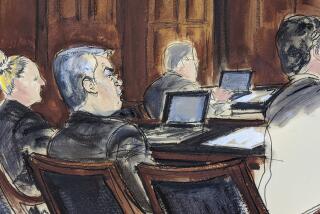Guatemalan massacre recalled in trial of suspected war criminal
- Share via
Horrific scenes of a civil war that ravaged Guatemala were relived Wednesday in a Riverside courtroom as testimony continued in the case of a suspected war criminal accused of lying on documents in order to become a U.S. citizen.
Jorge Sosa, a Moreno Valley martial arts instructor holding U.S. and Canadian citizenship, faces 15 years in prison and having his U.S. citizenship revoked if he’s convicted of failing to disclose his involvement in the Guatemalan army during the civil war, authorities said.
Federal prosecutors say Sosa was a commander in the Guatemalan military’s special operations force, known as the Kaibiles, and was involved in the 1982 massacre in the small village of Dos Eres.
Prosecutors say the elite commando unit slaughtered about 200 people -- including women, children and the elderly -- during the attack. Women were raped, they said, and villagers were gathered and thrown into a well. Prosecutors also said Sosa fired his rifle and flung a grenade into the well during the massacre.
Although prosecutors have focused much of their attention on the details of the assault, defense attorney Shaski Kewalramani argued in his opening statements that the trial is centered on whether Sosa lied on immigration paperwork.
“It’s not a war crimes tribunal,” Kewalramani said. “We’re not here to decide that. Its, “Did he lie?”
He said that in previous documents Sosa filed as part of a failed attempt to gain political asylum, the defendant had noted his time in the military and included a letter that contained a threat against his family because of his service. Immigration officials could see that document, years later, when Sosa was being considered for naturalization, Kewalramani said.
But in court Wednesday, prosecutors showed portions of the application, in particular the portion in which applicants are asked to list any previous affiliations and foreign military service. On Sosa’s form, it said “none.”
Prosecutors also called up witnesses who had served with Sosa in Kaibiles and were in Dos Eres. They said they were in pursuit of weapons that had been stolen by guerrilla forces. In the village, the women and children were ushered into a church and the men were taken to a school, they said.
“A 4 o’clock in the morning, you could hear women screaming, asking for help from where the church was,” Cesar Franco Ibanez, a former Kaibil, testified.
Ibanez said he was following orders when he took part in the rapes and threw women into the well. “We had to throw someone into the well to show that we were committed to the patrol,” he said.
After the massacre, Ibanez said, the soldiers were ordered to stay quiet about the attack. He said the group’s leaders told them that if they said anything “then we would not be alive anymore.”
He later surrendered and, as a protected witness, told authorities in Guatemala about what happened in the massacre.
He now works as a technician for washers and dryers, living in an undisclosed country that is neither Guatemala nor the United States. He receives a stipend of about $550 from the Guatemalan government, which, he says, goes toward paying for his children’s education.
Five soldiers convicted in the Guatemalan court system for their involvement in the incident were each sentenced to more than 6,000 years in prison. Ibanez, however, was not prosecuted, a point that Kewalramani focused on during his cross-examination.
The lawyer asked if Ibanez had received any promises of immunity from Guatemalan or U.S. officials; he said he had not.
“Well, if I have to pay for what I did,” Ibanez said, “so be it.”
ALSO:
AEG says $1.5 billion for Jackson’s death is ‘ridiculous’
UC imposes pension terms on employees; union protests
Serial rapist attacked at least 30 women, targeted immigrants
Twitter: @rar
More to Read
Sign up for Essential California
The most important California stories and recommendations in your inbox every morning.
You may occasionally receive promotional content from the Los Angeles Times.










